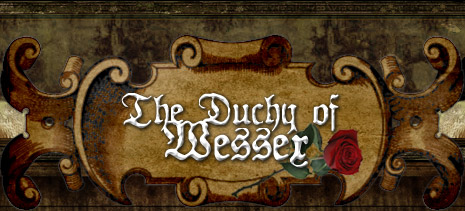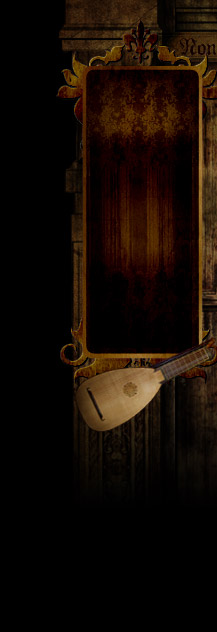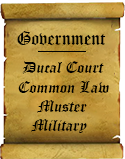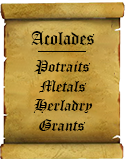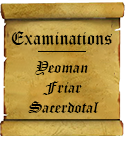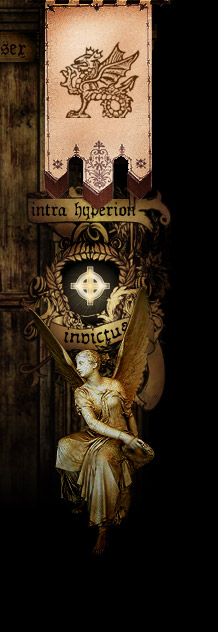

Ducal Court
From Eylbarand of Sanguine's "Register of the Mercian Territories":
"... which brings our survey to the few but unique counties palatine, most of which were granted in concession at the end of the Mercian Civil War four generations ago. As peers of the kingdom, the lords palatine have always enjoyed the considerable privileges of nobility, but their palatine powers have extended their dominion within their respective territories even further. All owe homage and fealty to His Majesty, yet it is understood that royal writs have no jurisdiction within these domains, nor do any of the king's sheriffs or justices have license to act on His Majesty's behalf. The Duchy of Wessex, for example, is one such Palatinate of His Majesty's Kingdom of Mercia, and as such, requires more extensive personnel to carry out the administration of its nearly sovereign government.
To examine the Wessexian model of government as illustration of our evaluation:
Appointments of the Ducal Cabinet
Each of the Cabinet Ministers administers a portion of the Duke's palatine power over Wessex. When an administer is absent other ministers will fill those responsibilities as circumstances require.
• Powers and Duties of the Chancellor:
The Chancellor of the Duchy of Wessex is second to the Duke in matters dealing with executive power and decision making. As we have seen, most counties appoint chancellors, but in Wessex the Chancellor also maintains the ducal seal and may conduct court and grant requests in the name of the duke, particularly with regards to magistracy and justice.
• Chamberlain:
To the Chamberlain of the Duchy of Wessex falls the responsibility for maintaining the provisions and resources of the Duchy as well as seeing to the comforts and entertainments of the city and castle interiors. The Chamberlain also plans, approves and zones all construction within the demesne of the Duchy. The Duchy of Wessex has no provisions against the building of adulterine castles, and does not require the Royal Chancery's approval before commencing with their construction. The Chamberlain also has access to the Ducal Seal.
• Constable:
The Constable of the Duchy of Wessex is responsible for seeing to the training and proper garrisoning of the strongholds within the duchy, including all drilling and placement of those owing castle-guard service. The Constable also leads the armies of the duchy to battle in the absence of the Duke and is responsible for seeing to the physical defenses of the duchy's strongholds. When it is the king who summons the Duke of Wessex to battle, however, his feudal obligations require him to attend in person with the ordained number of knights and men-at-arms without using his constable as a second.
• Admiral:
The Admiral of the Duchy of Wessex oversees the training, maintenance, and proper leadership of all vessels within the Duchy. The Admiral commands the fleets of Wessex in absence of the Duke and is responsible for the physical defenses of the duchy's harbors. The Admiral has the power to promote and assign rank to all sailors.
• Warden:
The Warden of the Duchy of Wessex is responsible for patrolling and keeping out undesirables from the duchy's borders and wildlands. With the Constable, the Warden also may promote and assign rank to rangers and soldiers.
• Master of Heralds:
The Master of Heralds oversees the house heralds, all of whom are responsible for the design and commissioning of new arms when they should be granted by the Duke, who also has the customarily royal power of Accolade. Receiving arms makes a family knightly and is the first rung of nobility within the Kingdom of Hyperion. Heralds also serve an important function in matters of correspondence and ceremony. The Master Herald of Wessex reports to the King of Heralds in Sol Invictus.
• Treasurer:
The Treasurer of the Duchy of Wessex oversees all matters dealing with revenue and its collection.
• Steward of Trade:
To the Steward of Trade falls the duty of maintaining and opening the various trade routes necessary to the good health of the duchy's commerce, the rights of which are granted to most palatinates. The Steward of Trade in his correspondences may and often does avail himself by appointing reeves as economic envoys.
His Grace requires thorough examination and interview with all appointees to the above positions and indeed most appointments to his ducal court. The Duke of Wessex is quite fond of these examinations and has standardized them into differing grades in order to appoint only the most scholarly and learned of officials.
![]()
Each of the Cabinet Ministers may appoint yeoman attendants to assist in the carrying out of their duties.
• Clerks:
Both the chancellor and the chamberlain are able to hire into the court's employ officers which are simply termed clerks. The clerks are directed by these two cabinet officers and are available to perform administrative duties.
• Heralds:
Heralds are charged with the commissioning and design of arms, carrying messages between heads of state, and making proclamations and announcements at ceremonial and social functions. The Head of Heralds directs the heralds of the duchy on behalf of the duke.
• Pursuivants:
A pursuivant is an apprentice herald who accompanies a herald and performs minor heraldic duties. A pursuivant is in training to become a herald, and does not need to take any of the examinations favored by the duke for court appointment provided he has a herald as his sponsor.
• Reeves:
Reeves are the appointed assistants of the Treasurer and Steward of Trade, and assist them in their duties.
• Quartermasters:
Provide administrative duties for each of the branches of the Ducal military. They ensure adequate supplies are available for use at a moments notice and acquire their inventory from the official Ducal stores.
Like the rest of Hyperion, however, most of the subjects of the Duchy of Wessex live and operate outside the employment of the local magnate's court.
An additional footnote of different manuscript is inserted over what appears to be Eylbarand of Sanguine's erased handwriting:
• Royal Sheriffs:
Royal sheriffs are appointed by the King of Hyperion to act as liaisons to the noble court of Wessex and to act as representatives of the king's justice.
• Knights:
Knights are gentlemen and lesser nobility, privileged with the prefix "Sir" or "Dame" throughout the kingdom of Hyperion. Rather than their skill at scholarly examinations, the Duke will elevate a soldier to knighthood because of his or her valor and extreme accomplishments in warfare. Recognition of the potential knight usually requires he or she have achievement in the arts of chivalry, which specifically means skill in melee combat, heavy armor, and horsemanship. The duke often grants rights to land and farming resources to a new knight, but he has been known to create knights bachelor, (that is, knights who bear the title without a grant of land or an oath of fealty). The duke, like most lords, recognizes that the military power of knights is the most valuable asset he has as a nobleman.
Naturally, becoming a knight means one can commission arms from a herald. Most of the duchy's current cabinet officers are in fact also knights. Knights have the power to sponsor or induct foreigners into the duchy as villeins sworn in fealty to the knight. As lesser nobility, knights in Wessex also have the power to sponsor a villein or soldier as a personal esquire to impart the necessary training in the arts of chivalry. In this way such esquires may more easily be recognized by the duke or even the king on their way to knighthood. Knights can also be made into peers by the king if their achievements are great enough, and this sort of benefice is what even the first Wessex dukes owe their seisen to.
• Baronets:
A baronetcy is an hereditary knighthood that has little to do with arms or chivalry. The duke sometimes grants a special dispensation in the form of a writ of baronetcy to fighting men or sages of exceptional renown who are not trained in chivalry. Baronets have all of the feudal powers of knights, receive heraldry, are styled "Sir" or "Dame", but are naturally more rare in Wessex than knights. The popular speculation and rumormongering that the Duke has favored magicians with this title are beneath the dignity of this writer and this work - I will simply say that in palatinates, the departure from central government often allows the appearance of a "nobility of the gown" as well as a "nobility of the sword".
• Soldiers:
Soldiers are villeins seeking to increase their fortune or alleviate their financial responsibility within the duchy by military service. The Constable recognizes three classifications or ranks: footmen, men-at-arms, and sergeants. Footmen are the least wealthy, most poorly equipped soldiers. Men-at-arms often own a good coat of mail and a good weapon, but lack a horse. Sergeants are mounted light cavalry with fairly good weapons or armor who yet bear no knightly title. Equivalents of such ranks exist for missile infantrymen.
• Rangers:
Rangers are soldiers who patrol the forests and wilderness of Wessex, and who usually take orders directly from the Warden.
• Burgesses:
Burgesses are often ex-villeins who worked as soldiers or artisans whom often carry on a trade or profession in the city or their local fief. Burgesses are freemen who owe no fealty or military service to a liege lord unless he issues a levy.
• Villeins:
Villeins are tenants on the land of a knight or the duke. Most villeins give half of their income to their liege in return for protection and tenancy..."
